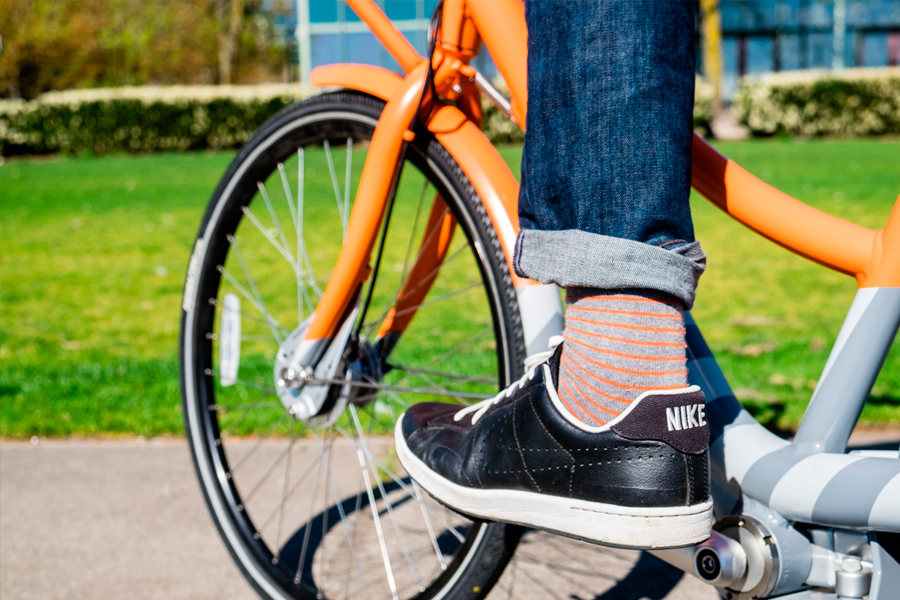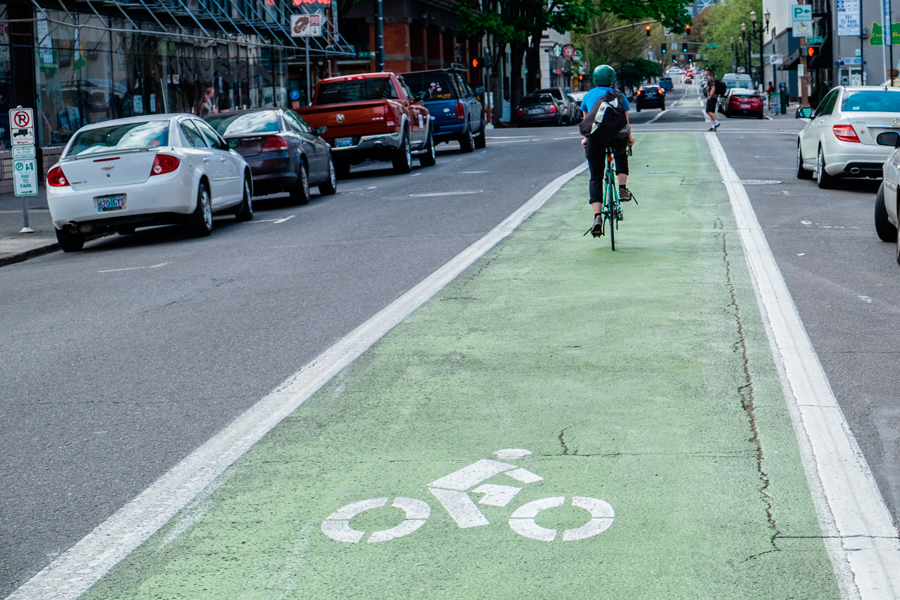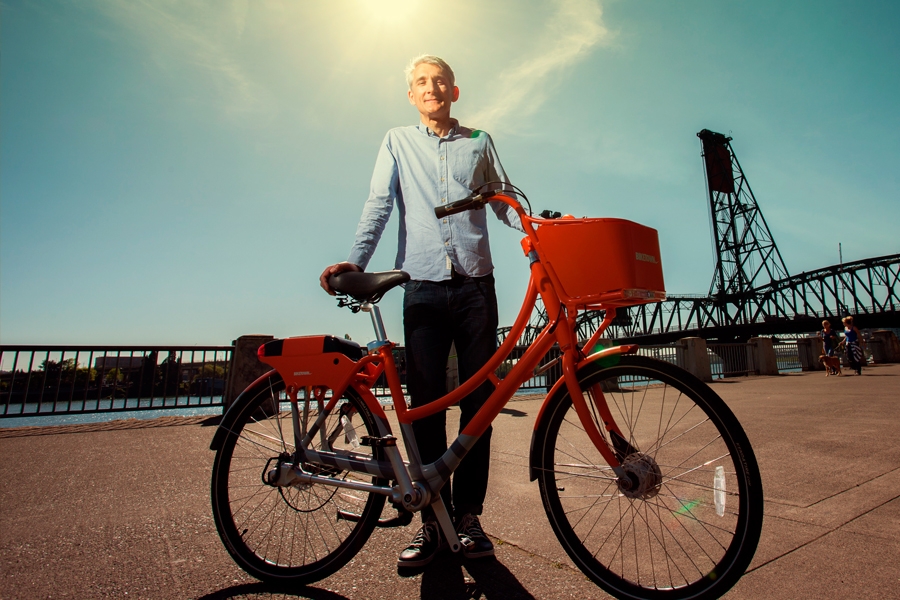Share this article! Although Portland is known as an American cycling mecca, Rose City denizen Kirsten Holmes doesn’t commute by bike as much as she did a few years ago. The issue isn’t illness or injury. Rather, the physician’s assistant used to live in the Hague, the bicycle-friendly capital of The Netherlands. “We rode bikes … Read more
Although Portland is known as an American cycling mecca, Rose City denizen Kirsten Holmes doesn’t commute by bike as much as she did a few years ago.
The issue isn’t illness or injury. Rather, the physician’s assistant used to live in the Hague, the bicycle-friendly capital of The Netherlands. “We rode bikes everywhere there,” Holmes says. “It was part of the culture. Here I just ride to get around occasionally. I wouldn’t call myself a regular biker in Portland.”
Holmes is precisely the demographic the city is targeting with its long-delayed bike-sharing program, which is set to launch in July. Sponsored by footwear giant Nike to the tune of $10 million, its boosters hope to reinvigorate Portland’s two-wheeling street credibility and encourage more people to leave their cars parked at home.
City officials, cycling advocates and local businesses — from high-tech startups to well-established law firms — all expect bike sharing to help restore what many describe as the region’s faltering reputation as a national leader in urban planning and quality-of-life issues.
Portland is inarguably bike friendly, with 7.2% of all commuters going by bike.
But the city is also late to the game when it comes to bike sharing: More than 60 other cities across North America already enable people to hop on a public bike in one spot and drop it off at another within a designated area. And that laggard status hurts the pride of a place that has long considered itself at the vanguard of urban cycling.
“We were far from the first, and that’s not a position we’re used to being in with regards to biking,” says Steve Hoyt-McBeth, the lanky, silver-haired manager of Portland’s bike-share program, which sponsor Nike has dubbed Biketown.
Though he has championed the project since 2007, a litany of challenges conspired to keep Portland bike sharing-free over the years. There were initial difficulties finding funding and problems with the bidding process. Former mayor and biking advocate Sam Adams’ scandal-plagued time in office left the program adrift.
And the Montreal-based bike-sharing equipment maker Bixi, which was to supply the equipment for the Portland program, filed for bankruptcy in 2014, casting doubt about the viability of the concept.
Now, with a $2 million federal grant secured and Nike onboard for $10 million over five years, Hoyt-McBeth is on the verge of seeing bike sharing finally become reality in Portland.
“It’s like finally watching your kid graduate high school,” Hoyt-McBeth told Oregon Business at a Biketown neighborhood open house event in March.
The partnership enables the Portland Bureau of Transportation (PBOT) to expand the public-private partnership from 600 to 1,000 bikes — or by 66% — at the launch this summer. The system will also use cutting-edge “smart bikes” with integrated communications and locking technology, freeing riders from having to find a station within the rental area once they’ve reached their destination.
Motivate, the Brooklyn-based company that will manage Biketown, estimates the service will pull in nearly $7 million from 5,000 regular users and occasional riders over the next five years — although the city has not yet officially signed onto those figures.
Portland is also hoping its marquee backer will allow it to avoid the pitfalls seen by Seattle’s struggling bike-sharing program, Pronto, which was bailed out by the city in March for $1.4 million.
“This is how public-private partnerships should be done,” said Portland city commissioner Steve Novick in a statement when Biketown was announced. “And in Nike, we have a sponsor that is a brand powerhouse and global leader in innovation with a long record of supporting sports and physical activity in Portland.”
Nike’s $10 million commitment does, in fact, appear to provide the program crucial time to establish itself. It’s also a clever way for the footwear maker to put down a marker in a city it has long claimed as its own.
While competitors Adidas and Under Armour are both expanding their offices in Portland proper, Beaverton-based Nike is expanding in the less millennial-friendly suburbs. So Nike executives are likely gleefully awaiting the prospect of their rivals’ employees pedaling up to work on a bright- orange Nike-branded bike.
“Oregon has been our home for more than 40 years, and our roots run deep across the state and in Portland, which is home to 5,700 of our employees,” Jorge Casimiro, Nike vice president for global community impact, says.
While the city is hoping to improve urban mobility with bike sharing, Nike’s $10 million investment — which some will inevitably call “bikeytown” — will ensure its brand visibility all over Portland for the next five years. The deal even allows special ad “wraps” for some bicycles.

Jonathan Maus, a longtime cycling advocate who runs the website BikePortland.org, is optimistic that Biketown will both be a success and help increase support for bike riders in the city. “Cycling still hasn’t crossed over to the mainstream yet,” says Maus. “Bike share is game changing. This isn’t the bike culture stuff. This is people riding with upright bikes in regular clothing.”
Though he blasts “silly” political calculations for not investing any city money on the project, Maus says PBOT scored a real coup by getting Nike to sponsor it. “It really changes everything. It’s a huge way to silence critics both private and public,” he says. “The Nike deal brings respect, stability and deep pockets. It’s quelled all fears about its sustainability. They’re arguably the best marketers in the word.”
Maus also dismisses criticism that the bike share wouldn’t do much to benefit the cycling community. “People who bike a lot are going to say this isn’t for me. They’d rather have a dedicated bike lane,” he says. But he calls such thinking shortsighted, explaining that having more bikers on the roads will only increase momentum for other cycling infrastructure.
The project’s boosters are hoping to tap the changing nature of Portland’s economy, as younger people — often working in the booming tech industry — come looking for an urban lifestyle. And firms from diverse industries welcome bike sharing as another factor helping them attract and retain talent.
Eric Breon, CEO and founder of the vacation rental portal Vacasa, says some 40% of his employees either biked or took public transport to work. “We’re in Portland for the people. Our engineering team is growing,” he says at his company’s stylish office on Northeast Portland’s Alberta Street. “Engineers make good money, but they value other things: walkability, bikeability. We need to be in neighborhoods we can recruit to.”
Breon, who is an avid mountain biker, shows off an aerodynamic competition helmet he was considering purchasing on his laptop. “I don’t do as much urban biking, but I could be an opportunistic bike- share user,” he says.
That’s because Vacasa is soon moving to a big new space in the centrally located Pearl District, replete with a secured bicycle garage and regular company-sponsored visits from a bike mechanic. “We want to take Vacasa’s bike culture to the next level,” he says.
Those sentiments were echoed by Bill Miner, the partner in charge of the Portland office at Davis Wright Tremaine LLP. The law firm, which has roots stretching back a century in the city, is planning to make bike-sharing costs reimbursable under its employee wellness program.
“We’ve been here a long time. Our business is our people, our talent. The ability to attract diverse talent across the country is very important,” Miner says. “It’s things like this that help make our city so livable.”
Not everyone is convinced that a bike- share system will have a significant, positive impact on the local economy. “I think it’s primarily for the tourism industry, and that’s great,” Sandra McDonough, president and CEO of the Portland Business Alliance, says. “It’s a great program. But we weren’t really involved in its development.”
Her skepticism isn’t shared by companies likely to face direct competition from Biketown, including bike tour and rental operators. “We’re pretty excited about it,” says Sarah Gilbert, in charge of tour development at Pedal Bike Tours.
“Sure, there will be some impact with our rental business, but it will increase the acceptability of bikes here. And that’s something positive for us. It’s just about the way the city embraces biking.”
And that’s something PBOT’s Hoyt-McBeth plans to continue developing even after Biketown launches this summer. He said his team was already considering creative ways to expand the program down the road that fit with Portland’s quirky biking spirit.
“It’s part of our DNA,” Hoyt-McBeth says, growing animated while describing the possibility of adding cargo bicycles to the Biketown fleet for people to move stuff around town.
Such innovations could help stave off competition from private bike-share rivals such as Spinlister, which launched in Portland last summer. (Spokesperson Andrew Batey declined to share information about the number of Spinlister bikes and renters in Portland.)
Will bike share catalyze a new era of cycling innovation in Portland? Kirsten Holmes, for one, is hoping the service will make Portland a bit more like her former home, The Hague. “If there are more cyclists, they’ll put more into the infrastructure,” she says. “It’s a cool option.”

The Intelligent Cyclist
Portland’s bike-sharing program was years in the making. But the city’s unintentional tardiness has yielded one advantage: The Rose City program features the latest in “smart bike” technology.
Would-be riders locate bikes at one of several stations within a circumscribed area of the city center. After a short registration process, they can then peddle away to their intended destination before locking it up at another station — or, unlike traditional bike sharing, anywhere they choose.
“We had the benefit of learning from other cities, and now we can hopefully leapfrog them by having the largest smart-bike system in North America,” says Hoyt-McBeth.
Provided by the Brooklyn-based firm SoBi, Biketown cycles will have self-contained communications and locking equipment.
The technology allows them to be secured to any regular bike rack inside the rental area. Other users will be incentivized to ride the bike back to a Biketown station by using discounted pricing, ideallyideally offsetting so-called rebalancing costs of retrieving wayward bicycles.
If at First You Don’t Succeed…
Biketown will be managed by Motivate, a firm operating similar bike-sharing systems in New York City, Chicago, Washington, D.C., Toronto and Seattle, among many other cities.
“Portland is a great city for cycling with a proud tradition. There’s an involved community that takes it really seriously,” says Michael Pellegrino, Motivate’s launch director. “And Nike’s investment lets us serve more of Portland.”
Of course, Nike’s cash will also — hopefully — keep Motivate from suffering another humiliating situation like the recent bailout in Seattle. Along with the federal grant money, user fees are the only other source of financing for Portland’s bike-sharing program.
Riders will pay on average $2.50 for 30 minutes, making it one of the cheapest bike-share offerings in the country. Annual membership, providing 90 minutes of ride time each day, is expected to cost between $10 and $15 a month. The city and Motivate are also considering a pay-by-the-minute pricing structure.
Around the State
The city of Eugene has secured $1.2 million in state funds for a bike sharing program to launch by October 2017. In partnership with Zagster, a Massachussets-based company, Jackson County launched a bike share program in July 2015. The program serves Ashland, Medford and White City.



